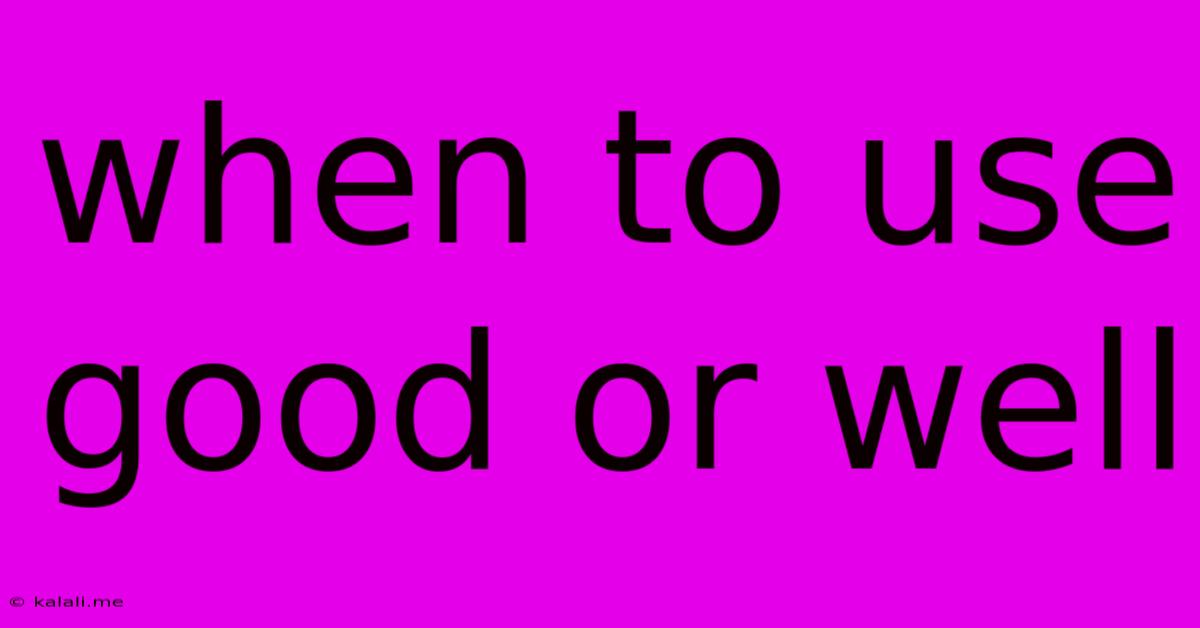When To Use Good Or Well
Kalali
Jun 07, 2025 · 3 min read

Table of Contents
When to Use "Good" vs. "Well": A Definitive Guide
Choosing between "good" and "well" can be tricky, even for native English speakers. This seemingly simple grammar point often causes confusion, leading to incorrect usage. This guide provides a clear explanation of when to use each word, ensuring your writing is both grammatically correct and impactful. Understanding this distinction will significantly improve the clarity and professionalism of your writing.
"Good" and "well" are often confused because they both describe quality or state, but they function differently grammatically. "Good" is an adjective, while "well" can function as both an adverb and an adjective. This fundamental difference dictates their usage.
Good: The Adjective
"Good" modifies nouns. It describes the qualities or characteristics of a person, place, thing, or idea. Think of it as answering the question "What kind?" or "Of what nature?".
Here are some examples of "good" used correctly:
- "He is a good student." (Describes the student)
- "That's a good idea." (Describes the idea)
- "She had a good time at the party." (Describes the time)
- "The food tasted good." (Describes the taste, which is a quality of the food)
Well: The Adverb and Adjective
The usage of "well" is more nuanced.
1. Well as an Adverb:
"Well" modifies verbs, adjectives, or other adverbs. It describes how an action is performed or the manner in which something exists. It often answers the question "How?".
Examples of "well" used as an adverb:
- "She sings well." (Describes how she sings)
- "He plays the piano well." (Describes how he plays)
- "The team performed well under pressure." (Describes how the team performed)
- "I am well aware of the situation." (Modifies the adjective "aware")
2. Well as an Adjective:
"Well" can also act as an adjective, but only when describing health or overall condition. In this context, it's essentially synonymous with "healthy".
Examples of "well" used as an adjective:
- "She is well after her illness." (Describes her health)
- "He's feeling well today." (Describes his health)
- "Are you feeling well?" (Enquires about someone's health)
Common Mistakes and How to Avoid Them
A common mistake is using "good" instead of "well" when describing how something is done. Always remember that "well" is the adverbial form. For instance, saying "He plays the guitar good" is incorrect; the correct usage is "He plays the guitar well."
Another area of confusion is the use of "good" with "feel," "look," "smell," "sound," and "taste." While these verbs often seem to behave like linking verbs, requiring adjectives, "good" is still used correctly because it describes the sensory experience.
Summary Table: Good vs. Well
| Word | Function | Example |
|---|---|---|
| Good | Adjective | "The cake is good." |
| Well | Adverb | "He plays the guitar well." |
| Well | Adjective | "She is well." |
By understanding the grammatical roles of "good" and "well," you can eliminate common errors and confidently use these words correctly in your writing and speaking. Mastering this distinction will refine your communication skills and impress your audience with your command of the English language.
Latest Posts
Latest Posts
-
Basement Flooded Water Heater Not Working
Jun 08, 2025
-
How To Find A Collision Force
Jun 08, 2025
-
What Numbers Add Up To 25
Jun 08, 2025
-
Drill Bit To Drill Through Stainless Steel
Jun 08, 2025
-
How Do You Say Check In In Spanish
Jun 08, 2025
Related Post
Thank you for visiting our website which covers about When To Use Good Or Well . We hope the information provided has been useful to you. Feel free to contact us if you have any questions or need further assistance. See you next time and don't miss to bookmark.